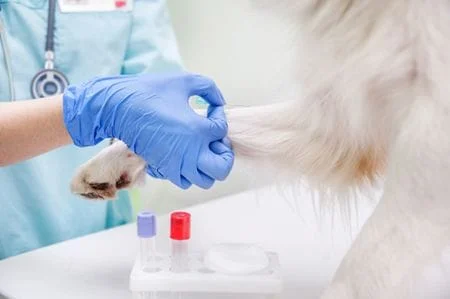Blood tests are an essential part of checking organ function and diagnosing what is ailing your pet, just as they are in human medicine.
Blood tests can tell the veterinarian whether your pet is dehydrated, has anemia or is suffering from certain cancers or chronic diseases.
Common blood tests used by veterinarians
There are four main categories of wellness testing for your pet: complete blood count (CBC), biochemistry profile, urinalysis and thyroid hormone testing. The veterinarian will advise you on how extensive the testing should be for your pet.
Complete Blood Count (CBC): This test gives information about the different cell types in the blood. These include red blood cells, which carry oxygen to the tissues; white blood cells, which fight infection and respond to inflammation; and platelets, which help the blood to clot. The CBC provides details about the number, size, and shape of the various cells types, and identifies the presence of any abnormal cells. It is a routine test used in all stages of health and illness and can indicate the presence of many forms of disease.
Biochemistry Profile: This is a panel of tests that provides information about the organs and tissues of the body, and helps to detect diabetes, kidney disease, liver disease, and other metabolic disorders. If minor abnormalities are found on the biochemistry profile, the veterinarian may suggest that the tests be repeated in a few days, weeks or months. If the abnormalities are more serious, then a more extensive diagnostic workup may be recommended, including expanded or confirmatory testing profiles, X-rays or ultrasound.
Urinalysis: Urinalysis is a routine test that reports the physical and chemical properties of your pet’s urine. Urinalysis provides information about how well the kidneys are working and identifies inflammation and infection in the urinary system. It can also help to detect diabetes and can be useful in the diagnosis of cancer within the urinary system. Urinalysis is part of a comprehensive assessment of the kidneys and urinary system.
Thyroid testing: The thyroid gland acts like a thermostat and sets the metabolic rate of the whole body. The most common thyroid disease in the dog is HYPOthyroidism, which occurs when the thyroid gland fails to produce enough thyroid hormone. Hormone levels should be tested routinely in middle-aged to older dogs. Even young dogs should be tested if they show signs of hypothyroidism such as unexplained weight gain, lack of energy, recurring skin or ear infections, or hair loss on the body and tail. The most common thyroid disease in the cat is HYPERthyroidism, which occurs the thyroid gland produces too much thyroid hormone. This is most commonly seen in older cats over 10 years old but can be in cats as young as 6 years old. Signs of hyperthyroidism include weight loss, increased activity, increased eating, drinking and urinating. The good news is both of these variations are easily treatable. (Well easy is relative in cats!)
Benefits of in-house diagnostics and bloodwork
We offer in-house blood work for pre-anesthetic screening for middle aged pets, acute illnesses, pediatric and small pets with small blood volumes. We offer CBC, biochemistry profile, urinalysis and cortisol screening tests. We get the results in less than an hour.
Benefits of Outside lab diagnostics and bloodwork
We offer outside lab diagnostics and blood work through ANTECH Diagnostics for pre-anesthetic screening for geriatric pets, illnesses that require lab technician reviews, more extensive testing for hormonal (thyroid and calcium) and genetic (clotting and neurological) diseases. They also process our biopsy and aspirate samples. In addition, there are veterinary specialists in internal medicine, endocrinology, oncology and dermatology available for consultation. These results can take 1-2 days to return for CBC, biochemistry profile, urinalysis, thyroid and cortisol tests and up to 10 days for biopsy and mass aspirate samples.

